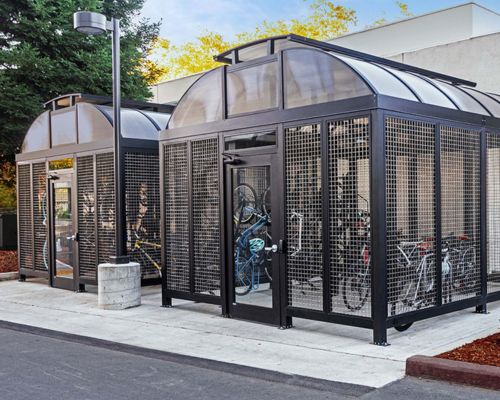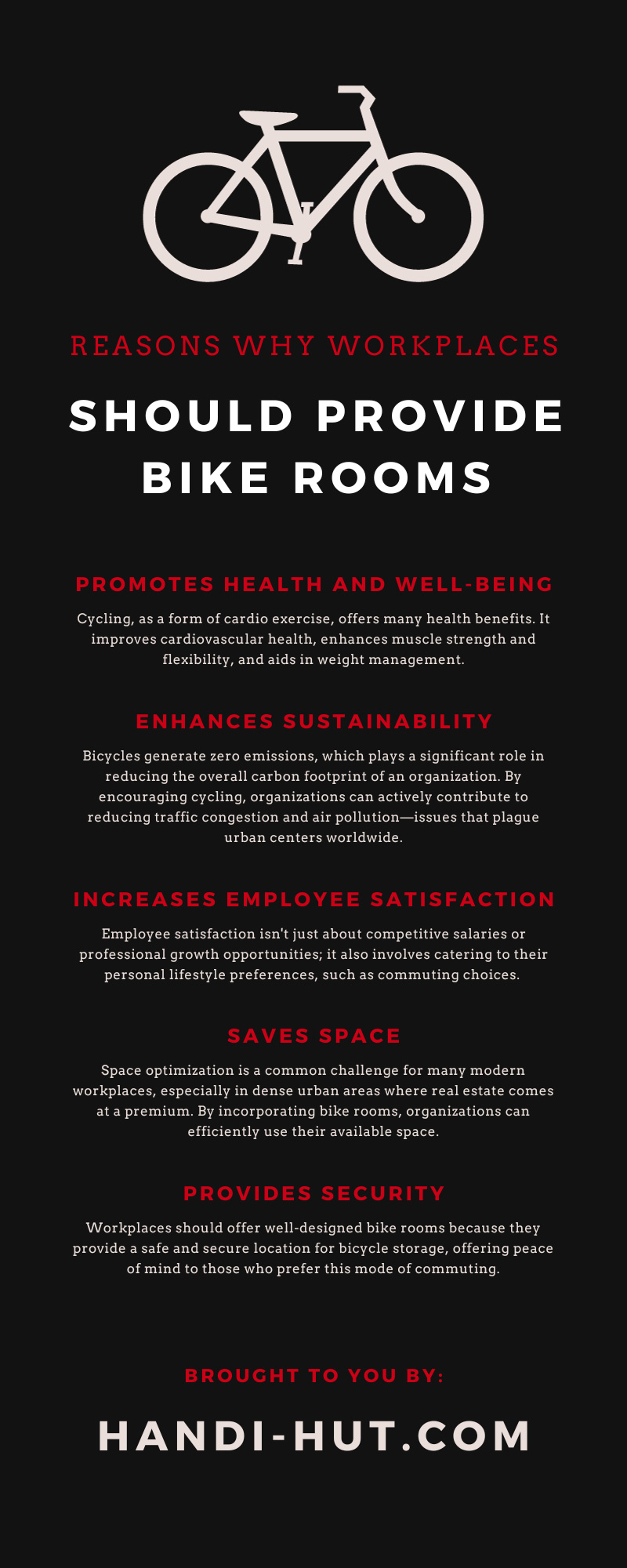
A bike room represents an organization’s commitment to the well-being of its employees, environmental sustainability, and responsive adaptation to the changing dynamics of commuting. As cities become more congested, providing bike rooms is essential in modern workplaces.
This strategic move has the potential to foster healthy habits, boost morale, reduce carbon footprints, and enhance an organization’s brand as a forward-thinking and eco-conscious entity. Businesses have a social responsibility to help achieve a greener future, and integrating simple but effective features will have positive results.
The reasons why workplaces should provide bike rooms will help businesses create a more functional and healthier environment. Strategies that keep employees happy and engaged will allow any company to thrive and deliver better productivity results.
Promotes Health and Well-Being
Cycling, as a form of cardio exercise, offers many health benefits. It improves cardiovascular health, enhances muscle strength and flexibility, and aids in weight management. Additionally, it can boost mental health by reducing stress and anxiety levels.
When workplaces provide bike rooms, they indirectly encourage employees to take up cycling as a daily practice. This exercise can help reduce the risk of chronic diseases, improve mental health, and increase productivity and energy levels.
Enhances Sustainability
Bicycles generate zero emissions, which plays a significant role in reducing the overall carbon footprint of an organization. By encouraging cycling, organizations can actively contribute to reducing traffic congestion and air pollution—issues that plague urban centers worldwide.
Commuting by bicycle also conserves energy resources because it requires no fuel except human energy. The construction and maintenance of bicycle shelters have a much lower environmental impact than other transport infrastructure, such as car parks and roads. These aspects make bike rooms eco-friendly facilities that align with the global emphasis on sustainable practices.
Increases Employee Satisfaction
Employee satisfaction isn’t just about competitive salaries or professional growth opportunities; it also involves catering to their personal lifestyle preferences, such as commuting choices. By providing a bike room, organizations acknowledge and respect the needs of employees who prefer cycling to work.
This gesture can lead to heightened feelings of inclusivity and consideration, boosting overall job satisfaction. They can seamlessly merge their personal values with professional lives, creating a more harmonious work-life balance.
Improves Employee Punctuality
Traffic congestion and unpredictable delays are common issues with most forms of motorized transportation, leading to delays that can disrupt an organization’s workflow. Employees who cycle to work usually have a more predictable commute time, resulting in improved punctuality.
The flexibility of cycling allows for a more streamlined journey. Cyclists can utilize bike lanes or shared paths, bypassing congested routes and reaching the workplace on time. This commute also eliminates the time spent searching for parking spaces, which can often add to driving delays.
Attracts Talent
Organizations need to differentiate themselves in a job market where potential employees have different choices. Offering unique perks like a bike room can be a compelling selling point. This amenity signals to job seekers that the organization values their employees’ well-being and environmental sustainability.
The organization showcases its forward-thinking approach and commitment to innovation by prioritizing such facilities. These attributes are highly attractive to potential employees, particularly among younger generations who often seek employers aligning with their values and lifestyle choices.
Saves Space
Space optimization is a common challenge for many modern workplaces, especially in dense urban areas where real estate comes at a premium. By incorporating bike rooms, organizations can efficiently use their available space.
A standard car parking space accommodates a single vehicle and can typically fit up to ten bicycles. Bike rooms can significantly increase the number of commuting employees an organization can cater to with the same space.
Reduces Parking and Transportation Challenges
Parking and transportation can be significant challenges in urban areas, often resulting in stress and lost time for employees. By providing bike rooms, organizations can help alleviate these issues, offering a practical solution that caters to a wide range of commuting preferences.
This can ease congestion in parking lots, making it easier for those employees who still need to drive to find a spot. Additionally, bike rooms can serve as a buffer against the inconveniences of public transportation, such as delays or overcrowded conditions.
Encourages Team Building
A bike room can serve as a central hub for fostering a sense of community, promoting workplace interactions beyond the confines of work-related contexts. Cycling clubs can form, where like-minded individuals can share their experiences, advice, and enthusiasm for cycling.
Such activities provide a platform for social interaction and promote a healthy sense of competition and cooperation, which are valuable for enhancing team dynamics. These cycling-related activities can also offer opportunities for leadership and initiative, as employees can take turns organizing riding events or schedules for maintaining the bike room.
Provides Security
Security is a key concern for employees who cycle to work, as the potential for theft or damage to their bicycles can be a significant deterrent. Workplaces should offer well-designed bike rooms because they provide a safe and secure location for bicycle storage, offering peace of mind to those who prefer this mode of commuting.
The bike room should have sturdy racks for secure parking and ideally be in a well-lit, monitored area to deter potential thieves. CCTV cameras and controlled access to the bike room can significantly reduce the risk of theft or vandalism, giving employees confidence that their valuable bicycles will be safe throughout the workday.
Demonstrates Corporate Responsibility
Corporate responsibility extends beyond an organization’s core operations and involves its broader societal impact. A bike room is a tangible demonstration of corporate responsibility, signaling that the organization is mindful of its role in promoting sustainable commuting, employee health, and community well-being.
By providing a bike room, an organization encourages cycling, which is a zero-emission mode of travel, actively contributing to environmental sustainability. This illustrates the organization’s commitment to acting as a responsible global citizen.
These reasons make it clear that bike rooms aren’t just a passing trend or a frivolous addition to the workplace. They’re a significant and strategic addition to modern work environments with multiple benefits for organizations and employees.
They foster a healthier and more engaged workforce, reduce operational costs, attract talent, and show that the organization is a responsible corporate citizen. Due to increasing awareness of environmental sustainability and work-life balance, promoting cycling by providing bike rooms is a strategic move that can yield significant long-term dividends for organizations.

